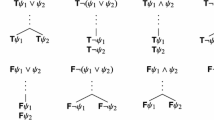Abstract
Motivated by aspects of reasoning in theories of physics, Robin Giles defined a characterization of infinite valued Łukasiewicz logic in terms of a game that combines Lorenzen-style dialogue rules for logical connectives with a scheme for betting on results of dispersive experiments for evaluating atomic propositions. We analyze this game and provide conditions on payoff functions that allow us to extract many-valued truth functions from dialogue rules of a quite general form. Besides finite and infinite valued Łukasiewicz logics, also Meyer and Slaney’s Abelian logic and Cancellative Hoop Logic turn out to be characterizable in this manner.
Similar content being viewed by others
References
Casari, E., Comparative logics, in Synthese 73, D. Reidel, 1987, pp. 421–449.
Casari, E., Comparative logics and abelian ℓ-groups, in C. Bonotto, R. Ferro, S. Valentini, and A. Zanardo, (eds.), Logic Colloquium ’88, Elsevier, 1989, pp. 161–190.
Ciabattoni, A., C. G. Fermüller, and G. Metcalfe, Uniform rules and dialogue games for fuzzy logics, in Logic for Programming, Artificial Intelligence, and Reasoning, vol. 3452, Springer, 2005, pp. 496–510.
Esteva F., Godo L., Hájek P., Montagna F.: Hoops and fuzzy logic. Journal of Logic and Computation 13(4), 532–555 (2003)
Fermüller C. G.: Dialogue games for many-valued logics – an overview. Studia Logica 90(1), 43–68 (2008)
Fermüller, C. G., Revisiting Giles’s Game, in O. Majer, A.-V. Pietarinen, and T. Tulenheimo, (eds.), Games: Unifying Logic, Language, and Philosophy, Logic, Epistemology, and the Unity of Science, Springer, 2009, pp. 209–227.
Fermüller, C. G., On Giles style dialogue games and hypersequent systems, in H. Hosni, and F. Montagna, (eds.), Probability, Uncertainty and Rationality, Springer, Frankfurt, 2010, pp. 169–195.
Fermüller C.G., Metcalfe G.: Giles’s game and the proof theory of Łukasiewicz logic. Studia Logica 92(1), 27–61 (2009)
Galli A., Lewin R. A., Sagastume M.: The logic of equilibrium and abelian lattice ordered groups. Archive for Mathematical Logic 43(2), 141–158 (2004)
Giles R.: A non-classical logic for physics. Studia Logica 33(4), 397–415 (1974)
Giles, R., A non-classical logic for physics, in R.Wojcicki, and G. Malinowski, (eds.), Selected Papers on Łukasiewicz Sentential Calculi, Polish Academy of Sciences, 1977, pp. 13–51.
Hajek, P., Metamathematics of Fuzzy Logic, Kluwer Academic Publishers, 2001.
Hölder, O., Die Axiome der Quantität urd die Lehre vom Mass, Ber. Verh. Sächs. Ges. Wiss. Leipzig. Math. Phys. Cl. 53:1–64, 1901.
Lorenzen, P., Logik und Agon, in Atti Congr. Internaz. di Filosofia, Sansoni, 1960, pp. 187–194.
Lorenzen, P., Dialogspiele als semantische Grundlage von Logikkalkülen, Archiv für mathemathische Logik und Grundlagenforschung 11:32–55, 73–100, 1968.
Metcalfe, G., N. Olivetti, and D. Gabbay, Proof Theory for Fuzzy Logics, vol. 36 of Applied Logic, Springer, 2008.
.Meyer, R. K., and J. K. Slaney, Abelian logic from A to Z, in G. Priest et al., (eds.), Paraconsistent Logic: Essays on the Inconsistent, Philosophia Verlag, 1989, pp. 245–288.
Paoli F., Spinks M., Veroff R.: Abelian logic and the logics of pointed lattice-ordered varieties. Logica Universalis 2(2), 209–233 (2008)
Author information
Authors and Affiliations
Corresponding author
Rights and permissions
About this article
Cite this article
Fermüller, C.G., Roschger, C. From Games to Truth Functions: A Generalization of Giles’s Game. Stud Logica 102, 389–410 (2014). https://doi.org/10.1007/s11225-014-9550-7
Published:
Issue Date:
DOI: https://doi.org/10.1007/s11225-014-9550-7




